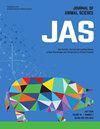在健康成年客户拥有的狗中,植物性(纯素)饮食与动物性饮食的粪便代谢组学特征
IF 2.7
2区 农林科学
Q1 AGRICULTURE, DAIRY & ANIMAL SCIENCE
引用次数: 0
摘要
尽管狗的植物性(纯素)饮食越来越受欢迎,但植物性饮食对狗的代谢影响尚未得到彻底调查。评估纯素饮食对狗粪便代谢组的影响可以为了解其对胃肠道和整体健康的影响提供有价值的见解。本研究评估了健康成年狗的实验性挤压纯素饮食(PLANT)与商业挤压动物性饮食(MEAT)的粪便代谢特征。61只客户拥有的健康成年狗完成了一项随机双盲纵向研究,其中包括4周的适应期,所有狗都接受肉类饮食,然后是12周的试验期,它们要么继续使用肉类饮食,要么改用植物饮食。粪便收集在基线(4周驯化后)和退出(实验期后)进行。粪便代谢物采用1H NMR谱法定量测定。采用多元混合模型伽马线性回归来评估代谢物浓度与年龄、性别和体重(BW)的关系,以及饮食和时间之间的相互作用。66种代谢物被量化。随着时间的推移,基线组和肉类饮食组之间的代谢物只有2/66不同。相比之下,66种代谢物中有46种的浓度随饲喂PLANT日粮的时间而变化。在退出时间点,与MEAT组相比,PLANT组饲粮中与碳水化合物发酵相关的代谢物如乙酸(p<0.01)和丙酸(p<0.01)和糖代谢物均有所增加。这些发现表明,以植物为食的狗的粪便代谢特征与以动物为食的狗不同,即使两种饮食具有相似的营养成分和处理方式。本文章由计算机程序翻译,如有差异,请以英文原文为准。
The Fecal Metabolomic Signature of a Plant-Based (Vegan) Diet Compared to an Animal-Based Diet in Healthy Adult Client-Owned Dogs
Despite the rising popularity of plant-based (vegan) diets for dogs, the metabolic effects of plant-based diets in dogs have not been thoroughly investigated. Evaluating the impact of a vegan diet on the fecal metabolome in dogs could offer valuable insight into the effects on gastro-intestinal and overall health. This study evaluated the fecal metabolic signature of an experimental extruded vegan diet (PLANT) compared to a commercial extruded animal-based diet (MEAT) in healthy adult dogs. Sixty-one client-owned healthy adult dogs completed a randomized, double-blinded longitudinal study consisting of a 4-week acclimation period, where all dogs received the MEAT diet, followed by a 12-week experimental period where they either continued with the MEAT diet or switched to the PLANT diet. Fecal collections occurred at baseline (after 4-week acclimation) and exit (after the experimental period). Fecal metabolites were quantified using 1H NMR spectroscopy. Multiple mixed model gamma linear regression was used to evaluate the association of metabolite concentration against age, sex, and body weight (BW), along with an interaction between diet and time. Sixty-six metabolites were quantified. Only 2/66 metabolites differed between groups at baseline and within the MEAT diet group over time. In contrast, 46/66 metabolites differed in concentrations over time in response to feeding the PLANT diet. At the exit time-point, dogs fed the PLANT diet had increased metabolites related to carbohydrate fermentation, such as acetic (p<0.01) and propanoic (p<0.01) acid and increases in sugar metabolites when compared to the MEAT group. These findings indicate that the fecal metabolic signature of dogs fed a plant-based diet is distinct from dogs fed an animal-based diet, even if both diets have a similar nutrient profile and are processed similarly.
求助全文
通过发布文献求助,成功后即可免费获取论文全文。
去求助
来源期刊

Journal of animal science
农林科学-奶制品与动物科学
CiteScore
4.80
自引率
12.10%
发文量
1589
审稿时长
3 months
期刊介绍:
The Journal of Animal Science (JAS) is the premier journal for animal science and serves as the leading source of new knowledge and perspective in this area. JAS publishes more than 500 fully reviewed research articles, invited reviews, technical notes, and letters to the editor each year.
Articles published in JAS encompass a broad range of research topics in animal production and fundamental aspects of genetics, nutrition, physiology, and preparation and utilization of animal products. Articles typically report research with beef cattle, companion animals, goats, horses, pigs, and sheep; however, studies involving other farm animals, aquatic and wildlife species, and laboratory animal species that address fundamental questions related to livestock and companion animal biology will be considered for publication.
 求助内容:
求助内容: 应助结果提醒方式:
应助结果提醒方式:


